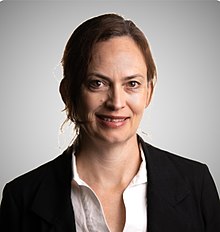|
Rebecca Priestley
Rebecca Katherine Priestley CRSNZ is a New Zealand academic, science historian, and writer. She is Professor in Science in Society at Victoria University of Wellington. EducationPriestley earned a BSc in geology at Victoria University of Wellington (VUW) in 1990, a Bsc (Hons), First Class, in physical geography at VUW in 1992, and a PhD in history and philosophy of science from the University of Canterbury in 2010 with a thesis titled Nuclear New Zealand: New Zealand's nuclear and radiation history to 1987, supervised by Philip Catton, John Hearnshaw and Philippa Mein Smith.[1][2] Academic careerPriestley is a Professor in Science in Society at Victoria University of Wellington, where she teaches undergraduate courses in science communication and creative science writing, and leads a Master of Science in Society programme.[3][1][4][5] The three areas of Priestley's research are: 20th-century history of science, with a focus on science in New Zealand and Antarctica; science communication and public engagement with science; and creative science writing practice. Priestley took a sabbatical to do a Master of Arts in creative writing at the International Institute of Modern Letters (IIML), in the nonfiction stream, writing a book about Antarctica. Priestley co-founded the Centre for Science in Society at Victoria University which focuses on the relationship between science, scientists, society, the history of science, and the communication of scientific ideas and issues to different audiences using the vast range of media sources available today. She was the 2016 winner of the Prime Minister's Science Communicator's Prize. In June 2017, Priestley co-founded the Aotearoa New Zealand Science Journalism Fund, which offers funding for projects reporting on science-related issues of importance to New Zealanders. In July 2018, Priestley was elected as a Companion of the Royal Society Te Apārangi.[6] Selected works
Awards
References
External links
|
||||||||||||||||
